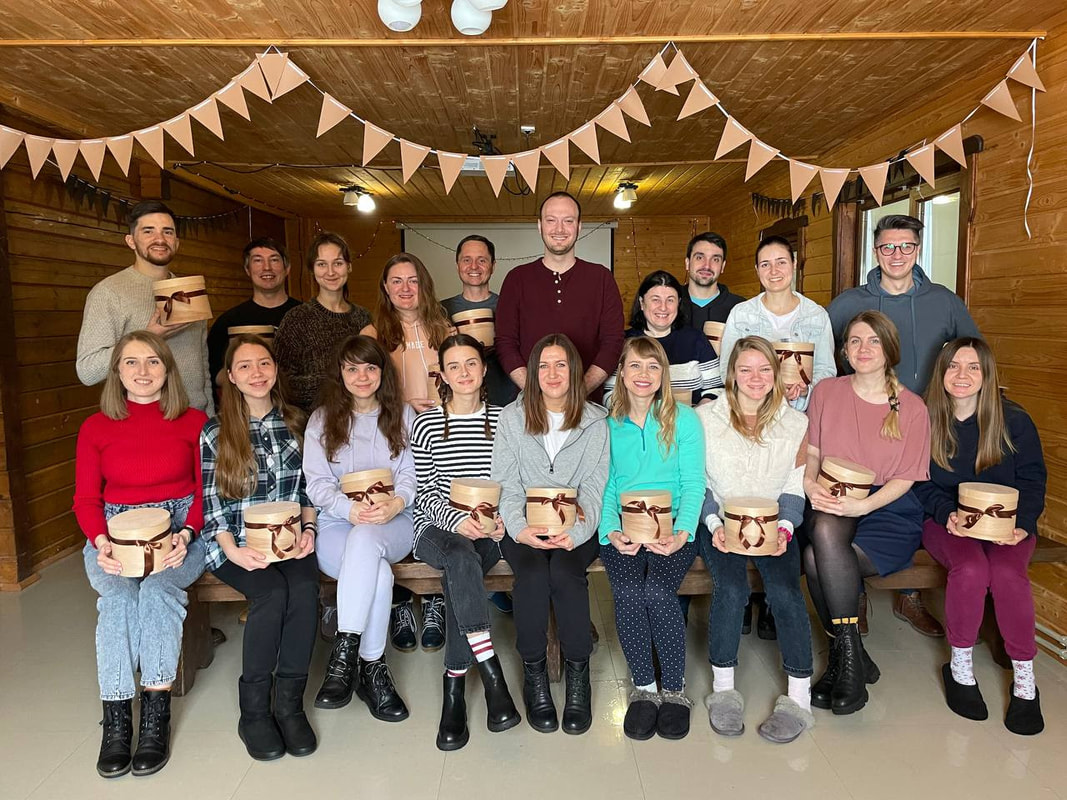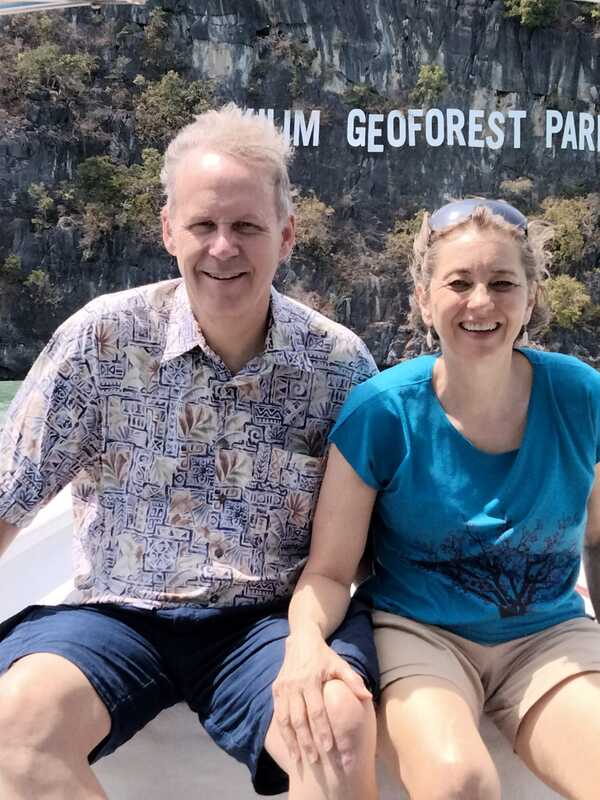|
The IFES Team in Ukraine During Happier Times
Friends, we very rarely send out special appeals for gifts. We are doing so today in light of the news of Russia’s attacks on Ukraine. Our dear friends who are incredibly faithful campus ministers are becoming internally displaced refugees or are likely to become ones very soon. CCX, the sister movement to InterVarsity in the US, has created a fund specifically to help their staff, who live on very low budgets, weather this dislocation. While there last month, we listened to the fears of this team, which includes a pregnant woman whose husband will be called up in the military reserves and staff members who wondered aloud how they would get not only themselves but elderly relatives and siblings with disabilities out of cities under attack. Several of the team members used to live and work in Crimea, and have already been displaced at least once after the Russian invasion in 2014. Staff live in cities of Kiev, Kharkiv, Odessa, and Lviv. At least three of these cities are now under direct attack, and staff are waking up this morning with a new reality facing them. So we urge you to join us in prayer for them, and as you are led, we encourage you to join us in giving, and use this link. If you do decide to give, please let us know. Thank you so much for your love and prayers, for us and for our friends in this time of distress.
0 Comments
Our “Travel Bubble” quarantine package included several fun outings.
[After his leprosy was healed, Naaman said to Elisha], “Please let me, your servant, be given as much earth as a pair of mules can carry, for your servant will never again make burnt offerings and sacrifices to any other god but the Lord. But may the Lord forgive your servant for this one thing: When my master enters the temple of Rimmon to bow down and he is leaning on my arm and I have to bow there also—when I bow down in the temple of Rimmon, may the Lord forgive your servant for this.” “Go in peace,” Elisha said. 2 Kings 5:17-19 Dear Praying Friends, The narrative of Naaman’s healing ends on an odd note. Preachers understandably often end the story at verse sixteen, avoiding this section in which Elisha can seem to condone idolatry. As we navigate multiple cultures these days, I find comfort and wisdom in Elisha’s words to Naaman. Naaman began the story a blustering and inflexible man, fulminating about the superiority of his nation’s rivers and frustrated that his healing did not proceed in the manner he had expected. He ends the story humble and profoundly grateful, exclaiming, “Now I know that there is no God in all the world except in Israel. So please accept a gift from your servant.” When Elisha refuses a monetary gift, Naaman changes course and instead asks for a gift: the gift of dirt. I (Lisa) love that. He wants some of the essence of the land where God has met him. He may intend to use it to build an altar. But he also foresees a conflict: he is still enmeshed in a complex system in which he must honor his king and even accompany him into the temple of the god Rimmon. Rather than erecting a barrier for Naaman, Elisha perceives his sincere heart and gives him a gracious benediction: “Go in peace.” We arrived in Malaysia three weeks ago. Though all our teaching remains on-line, we have had the joy of meeting students and colleagues that, before this, we had only seen in tiny Zoom boxes on the screen. I’ve been amused at the number of people who have said to Rich, “Oh, you’re quite tall!” Because, of course, they had never seen him other than in one of those tiny zoom boxes too. As we navigate the newness (to us) of this land, we want to receive its gifts with the humility of Naaman at the end of the story, confessing in advance where we will inevitably fall short due to our own cultural blinders. And we hope to navigate the differences we’re already encountering here with the graciousness of Elisha, speaking peace rather than turning molehills into mountains. Intercultural ministry is complex—we knew that before we landed here of course, but some of the specifics here have surprised us. On any given day we relate to at least four sub-cultures: Malay Muslims, who make up about 69% of the population of Malaysia. We are getting used to seeing women in hijabs, even when in swimming pools, and hearing the call to prayer on the loudspeaker near our apartment. Malay food is delicious, the Malay people are friendly, and we have learned several basic phrases with which to greet them, but our interaction with them is of necessity limited. (If you don’t understand why, feel free to ask us in a reply e-mail.) Chinese (23%) and Indians (7%): These ethnic groups make up the bulk of the rest of the population of Malaysia, and most of the students at SPTC. The differences between them and the ethnically Malay people are complex and hard to summarize here, and we are still learning the histories between the people groups here. British: The school we are primarily serving here was founded by a British team and is part of a larger British missional endeavor, an Anglican renewal movement anchored in Holy Trinity Brompton, in the UK. They are wonderful, faithful disciples and have welcomed us warmly. The sheer number of contextualized-for-Asia Alpha groups they have initiated with their Asian partners (over 5,000) is truly inspiring. However, at times we have hit slight differences between American and British sensibilities around what makes for a good theological education, or what is appropriate to ask or to reveal in a conversation. We’re learning to use kilometers to discuss distance, kilograms to discuss weight, Celsius to discuss the weather, and 16 to refer to 4 PM. And I now mark papers rather than grade them. Middle Easterners and other immigrants: This was a surprise. Within three blocks of our apartment are many good and inexpensive Middle Eastern restaurants, run by immigrants. Many came as refugees from Yemen, Syria, Iraq, etc. As vegetarians, we find that these are some of the most reliable places to find non-meat items on the menu, so we have eaten more lentil soup and tabbouli than we would have predicted! Another large refugee population here is Burmese, and we have already met Christians running several different schools or other ministries to serve them. As you can imagine, that is a fair amount to navigate. Add in the sheer concrete-jungle density of the city and its heat and humidity, and the fact that we’re about ten years older than we were when the pandemic began, and it’s no wonder we end our days a bit tired. (Okay, that last one is more a feeling than a fact, and more often expressed by me than by Rich.) And yet, we are so very grateful to be here. What’s next? We have viewed this ten-week sojourn as an opportunity to serve and to discern. If we sense God’s leading to invest long-term, as we think is happening, we need a visa solution. One that we are exploring would involve safely parking some funds in a bank account here and jumping through a series of other hoops that would take about six months. We are leaning toward beginning that process and will likely decide that in the next couple of weeks, so we’d appreciate prayer as we discern with our partners here and make a final decision. Prayer Requests:
|
Archives
April 2024
AuthorRich and Lisa Lamb Categories |


 RSS Feed
RSS Feed